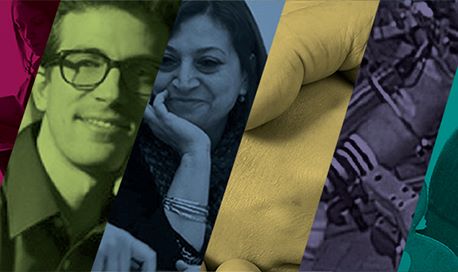Dr Paolo Plotegher is a Lecturer in Art Psychotherapy within the Occupational Therapy and Arts Therapies division at Queen Margaret University, Edinburgh.
- Overview
- Research Interests
- Research Publications
- Teaching and Learning
My academic background is in Visual Cultures, I studied a PhD at Goldsmiths, University of London, using autoethnography and the work of Foucault, Deleuze and Guattari to research on the impact of neoliberalism onto Western subjectivity and to explore forms of collective organising to counter that impact.
This research led me to initiate and take part in self-organised collectives, often inspired by feminist theories and practices of care and the commons – in particular Silvia Federici and Midnight Notes collective.
Through these experiences, which took place in London, Italy and Spain, I developed an interest in community and collective care that motivated me to train as an art therapist. Since that training I have been interested in bringing social change at the heart of therapeutic practices and I believe creativity, the nonverbal and the somatic aspects of the arts therapies can have an important role in doing that.
I’ve been working as an art therapist in different contexts, in therapeutic communities, homeless hostels, schools, acute wards and rehabs, in community centres, forensic settings, in people’s homes and in private practice with the Free Psychotherapy Network.
I have been offering art therapy experientials to collectives and community organisations, encouraging creativity and nonverbal expression in addressing organisational and power dynamics.
I am currently training as a systemic practitioner with the Family Therapy Training Network in Glasgow and I have a specific interest in Narrative Therapy and in supporting the construction of “scripts” alternative to the dominant discourses marked by oppression and discrimination – hetero-patriarchy, white supremacy, ableism in particular.
I am interested in in affirming difference and exploring the queer and queering aspects of arts therapies, I am passionate about working with GSRD, Gender, Sexuality, Relationship diversity, I identify as queer and my pronouns are he or they.
I am interested in the relationship between theory and practice, in how they can be collectivised and generate an impact on psycho-socio-ecological change.
I am particularly interested in researching how the tools offered by Deleuze, Guattari, Foucault, and more recently Suely Rolnik, Michael White, Isabelle Stenger, Tobie Nathan amongst others, can contribute to shape art therapy as a practice of emancipation and collective empowerment.
Active research interests:
• The influence of post-structuralism onto the psychodynamic tradition (Guattari, Suely Rolnik, Tobie Nathan).
• The impact of neoliberalism on shaping Western subjectivity and how the arts therapies might counter that.
• Institutional Analysis and the role of the arts therapies in supporting collectives and organisations (Guattari, Anne Querrien).
• Art therapy and its relationship with anti-psychiatry in Europe and the psychiatric survivors movement.
• Intergenerational and historic trauma and art therapy as addressing oppression and discrimination within an intersectional framework.
• Decolonizing art therapy as a practice.
• Queering art therapy and art therapy in support of GSRD (Gender, Sexuality, Relationship Diversity).
• Systemic and family art therapy and circularity in art therapy.
• Narrative practice and its use in art therapy.
• Eco-practices, earth-based spirituality and arts therapies.
Research Methods:
My research method has been shaped by a feminist approach that rethinks both theory and practice by starting from a collective sharing of lived experiences of oppression and emancipation.
I am also interested in how a Pedagogy of the Oppressed (Paulo Freire) can shape co-produced research.
I bring my personal and clinical experience at the core of teaching, with an approach that gives value to creativity and artmaking so that sensing / feeling / thinking and doing gets activated in the learning.
I believe that complex theory can stop being scary when it is put into practice and has effects on ourselves and the contexts we inhabit.
I believe in a pedagogy that, after Paulo Freire, values the knowledge which is already in the room and it’s expressed in ways that don’t conform to academic conventions.
Through my teaching at QMU I would like to share:
• My experience of working as an art therapist with LGBTQIA+ and with other minorities.
• Reflections on queer aspects of art therapy and what queering art therapy might involve.
• Insights into Institutional Analysis and art therapy experientials with collectives and organisations.
• Elements of a systemic approach to therapeutic practice and its possible convergence with the psychodynamic tradition, particularly with its post-structuralists declinations (Guattari).


